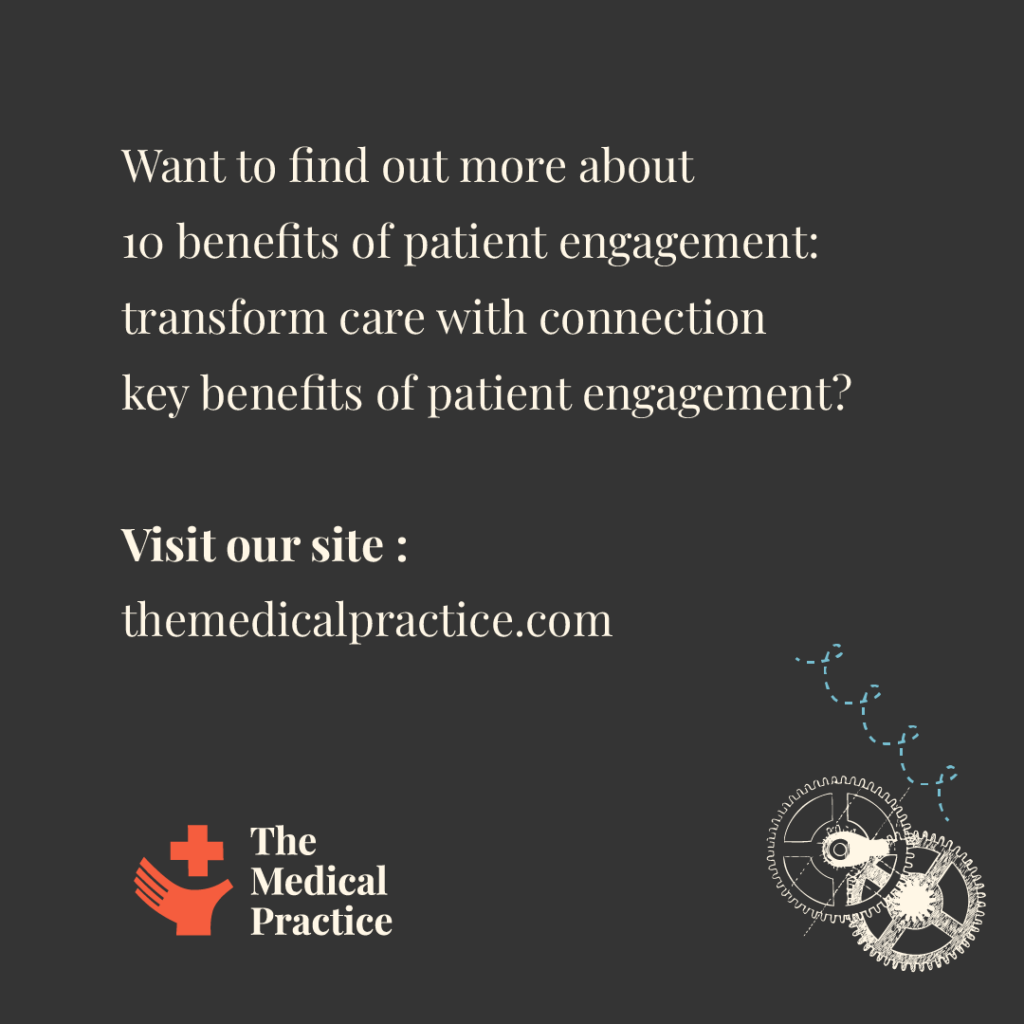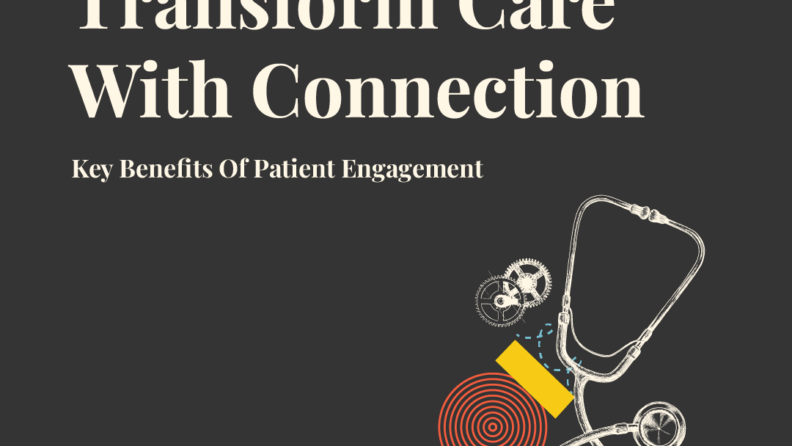Imagine walking into a doctor's office where the atmosphere feels more like a friendly conversation than a clinical check-up. That's the magic of patient engagement! It's not just about patients showing up for appointments; it's about them being an active player in their health journey. Think of it as the ultimate team sport—where the patient, doctors, and healthcare staff huddle together to tackle health challenges head-on.
The benefits? Better health outcomes, happier patients, and a healthcare experience that feels less like a chore and more like a partnership. And you don’t have to go it alone, check out my recommendations for patient engagement software solutions to help support your practice.
Ready to dive into how this innovative, modern approach is transforming healthcare? Let’s go!
What Is Patient Engagement?
Patient engagement is the process of actively involving patients in their own healthcare. It helps improve communication between you and your patients, making it easier to manage appointments, follow-ups, and treatment plans.
These solutions support your daily work by automating reminders, providing easy access to medical records, and facilitating direct communication through secure messaging. They make scheduling, tracking patient progress, and sharing information faster and more efficient.
Key Benefits Of Patient Engagement
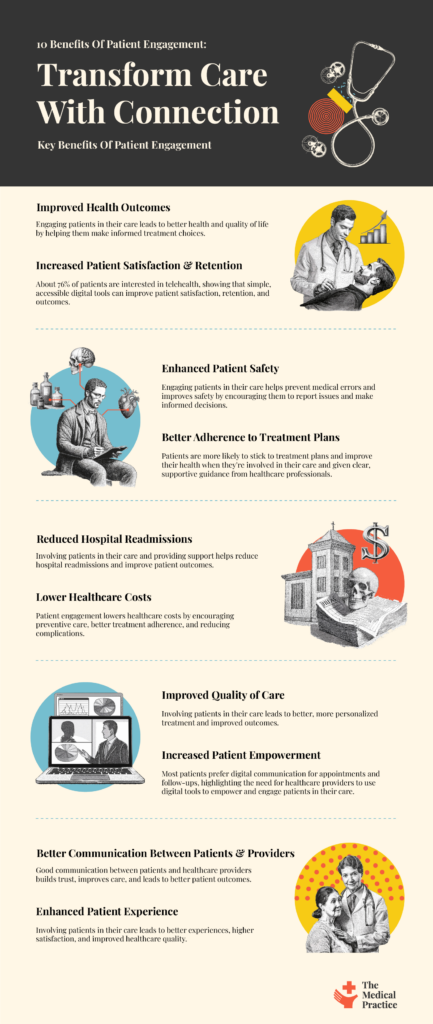
Now that we’re all on the same page about what patient engagement is, let’s get to the benefits you can expect when you implement these solutions!
Improved Health Outcomes
One of the most significant benefits of patient engagement strategies is improved health outcomes. When patients are actively involved in their own care, they are more likely to adhere to treatment plans, understand their health conditions, and take steps to manage their own health.
Engaging patients in the decision-making process allows them to make informed choices about their treatment options, leading to better health outcomes and a higher quality of life. Healthcare providers can enhance patient engagement by implementing initiatives that promote shared decision making and patient education, ensuring that patients have the information they need to make informed decisions about their care.
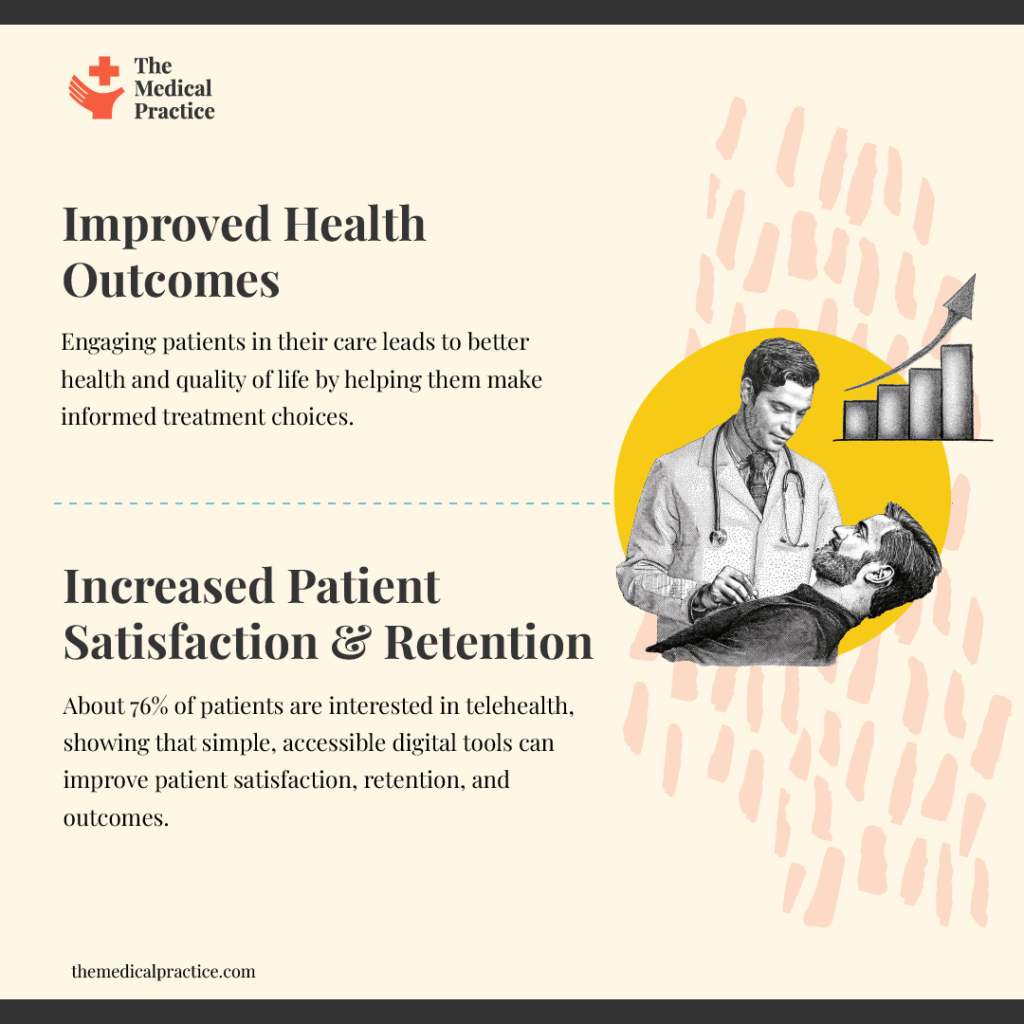
Increased Patient Satisfaction & Retention
About 76% of patients have expressed interest in using telehealth services, showing that accessible and convenient digital engagement can greatly enhance patient retention and satisfaction.
Increased patient satisfaction is another major benefit of patient engagement. When patients feel heard and involved in their care, their overall experience improves. Engaging patients in consultations and care planning helps to build trust between patients and healthcare providers, leading to higher levels of patient satisfaction.
Effective patient engagement strategies, such as using real-time messaging and providing easy access to health information, can enhance the patient experience and contribute to better retention rates within healthcare organizations. Patient satisfaction is also closely linked to patient outcomes, as satisfied patients are more likely to adhere to treatment plans and follow-up appointments.
Enhanced Patient Safety
Patient engagement plays a crucial role in enhancing patient safety. When patients are actively involved in their care, they are more likely to notice and report any discrepancies or errors in their treatment plans. This proactive approach to patient care helps to prevent adverse events and improves the overall safety of the healthcare system.
By promoting patient education and encouraging patients to participate in their own care, healthcare providers can reduce the risk of medical errors and enhance patient safety. Additionally, involving patients in shared decision making ensures that they are fully informed about the potential risks and benefits of their treatment options.
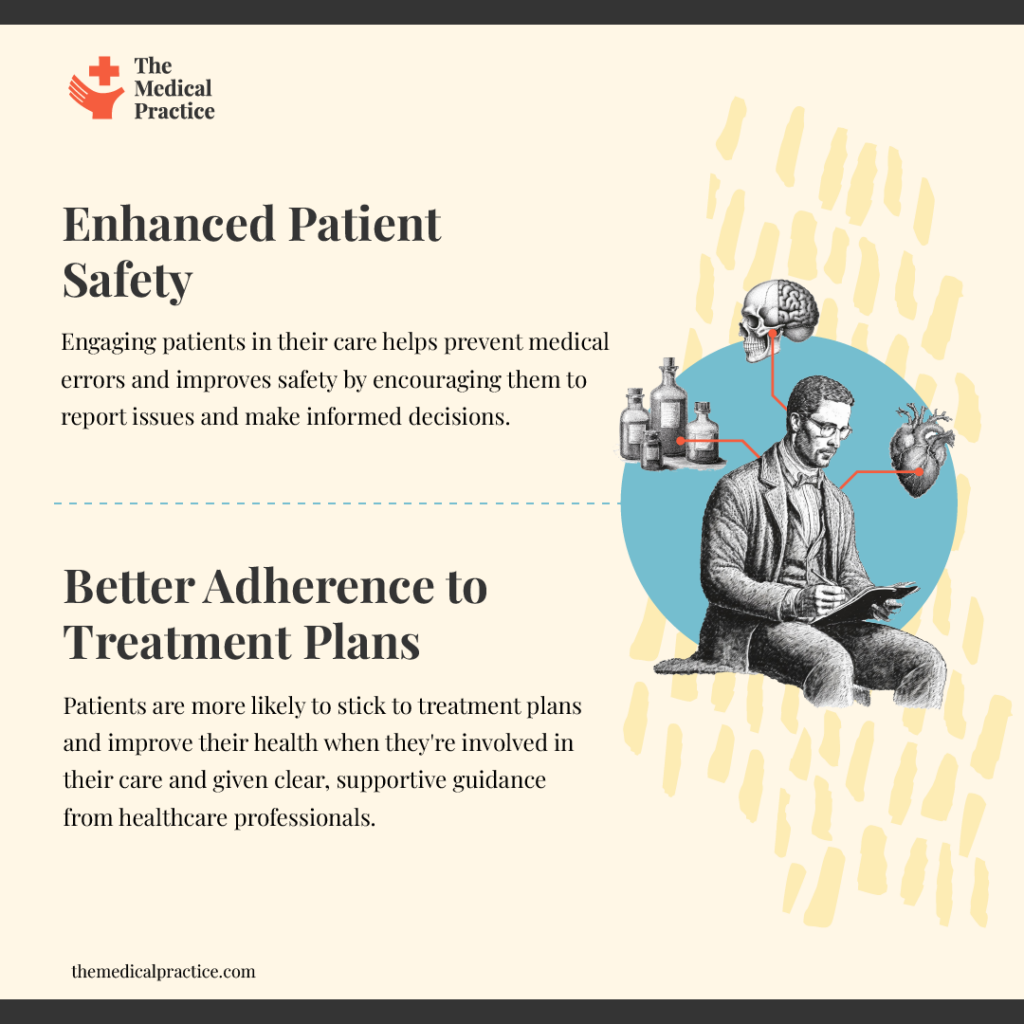
Better Adherence to Treatment Plans
Adherence to treatment plans is essential for achieving optimal health outcomes. Engaging patients in their own care process increases their commitment to following through with prescribed treatments and therapies. When patients understand the importance of their treatment plans and are involved in the decision-making process, they are more likely to adhere to their prescribed care.
Healthcare professionals can support better adherence by providing clear health information, offering patient education, and using collaborative care delivery models that involve patients in every step of their care process. Better adherence to treatment plans leads to improved patient outcomes and reduced rates of hospital readmissions.
Reduced Hospital Readmissions
Reducing hospital readmissions is a key goal of patient-centered care. Engaging patients in their care process helps to ensure that they understand their discharge instructions and follow-up care, reducing the likelihood of complications and the need for readmission.
By involving patients in shared decision making and providing ongoing support through follow-up appointments and patient education, healthcare providers can reduce hospital readmissions and improve overall patient outcomes. Effective patient engagement strategies, such as using electronic health records (EHR) to track patient progress and providing access to health information, are essential for achieving this goal.
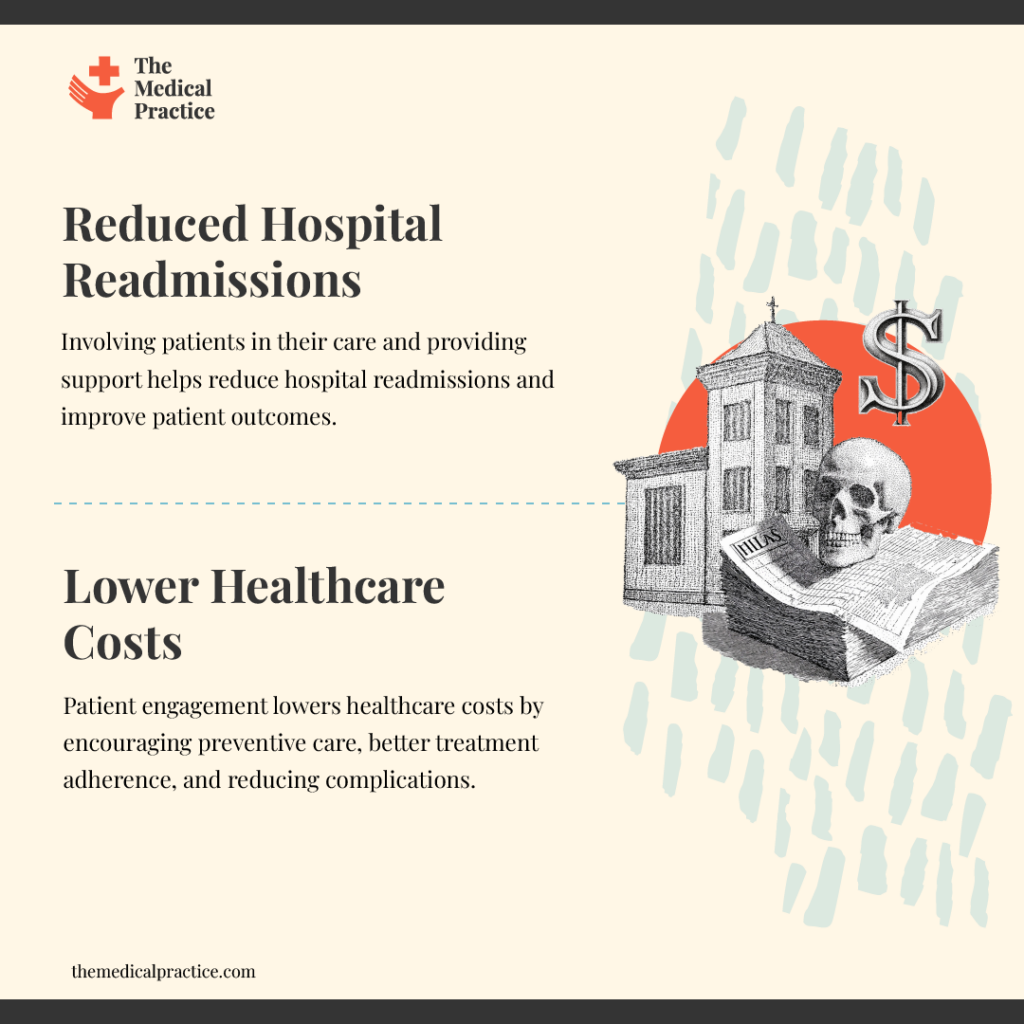
Lower Healthcare Costs
Patient engagement can also lead to lower healthcare costs. When patients are actively involved in their own care, they are more likely to take preventive measures, adhere to treatment plans, and avoid costly complications. By reducing hospital readmissions and improving health outcomes, patient engagement contributes to a more efficient and cost-effective healthcare system.
Healthcare organizations can further reduce costs by implementing patient engagement initiatives that promote self-management, patient education, and collaborative care models. Lower healthcare costs benefit both patients and the healthcare industry as a whole, making patient engagement a valuable investment for the future.
Improved Quality of Care
The quality of care provided to patients is directly influenced by the level of patient engagement. When patients are actively involved in their care, they are more likely to receive high-quality, personalized care that meets their individual needs.
Engaging patients in the care process allows healthcare providers to tailor treatment plans to each patient’s unique health conditions and preferences, leading to better patient outcomes and higher levels of patient satisfaction. Healthcare professionals can improve the quality of care by using patient-centered care models, promoting shared decision making, and involving patients in care planning and delivery.
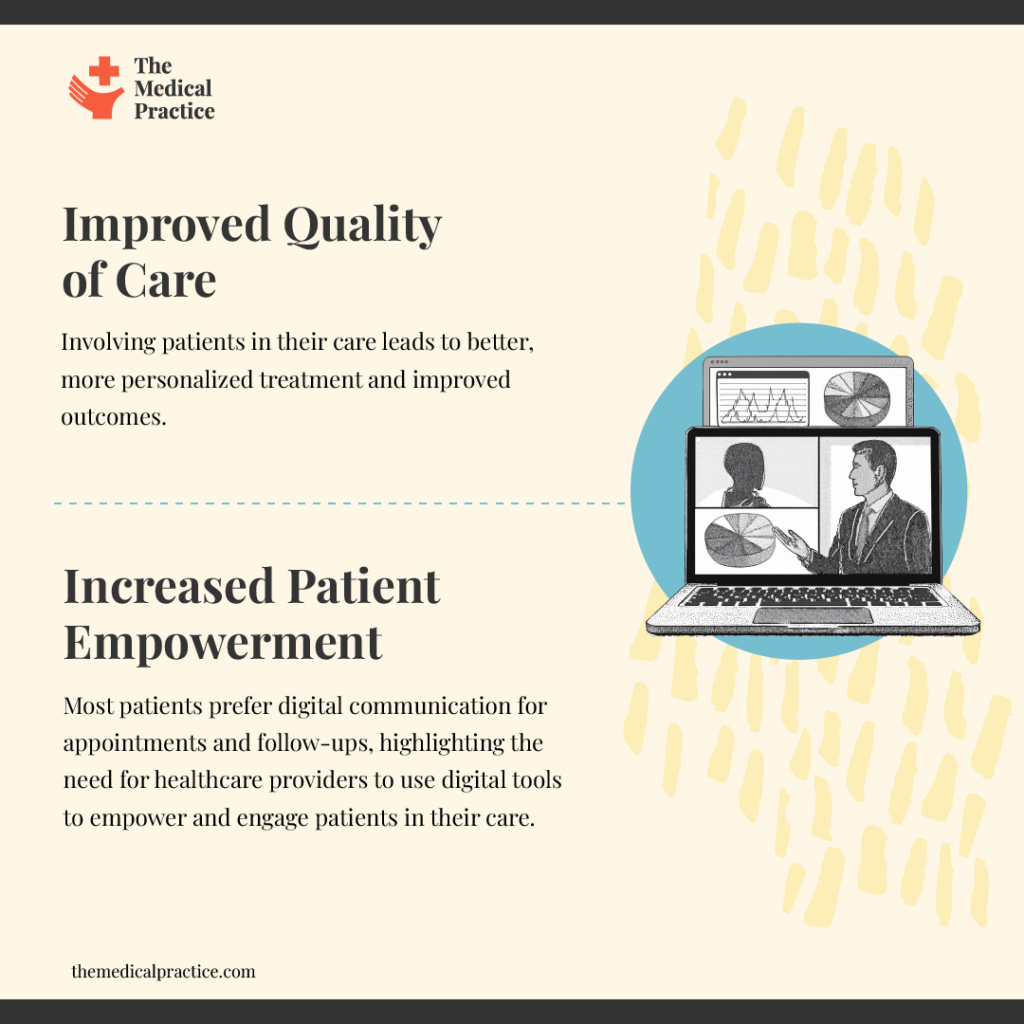
Increased Patient Empowerment
80% of patients prefer using digital communication channels such as emails, texts, or patient portals for managing appointments and follow-ups, underscoring the importance of integrating digital tools into patient empowerment strategies.
Patient engagement empowers patients to take control of their own health and well-being. By providing patients with the tools and information they need to manage their own care, healthcare providers can help patients become active participants in their own health journey.
Patient empowerment leads to better health outcomes, as patients who are engaged in their own care are more likely to make informed decisions, adhere to treatment plans, and take preventive measures to maintain their health. Healthcare organizations can promote patient empowerment by offering patient education programs, providing access to health records, and encouraging patient participation in care planning.
Better Communication Between Patients and Providers
Effective communication between patients and healthcare providers is essential for delivering high-quality care. Patient engagement strategies that promote open and transparent communication help to build trust and improve the patient-provider relationship.
By involving patients in the decision-making process and keeping them informed about their treatment options, healthcare providers can ensure that patients feel heard and understood. Better communication leads to improved patient outcomes, increased patient satisfaction, and a more positive patient experience. Healthcare professionals can enhance communication by using real-time messaging, providing clear health information, and involving patients in consultations and care planning.
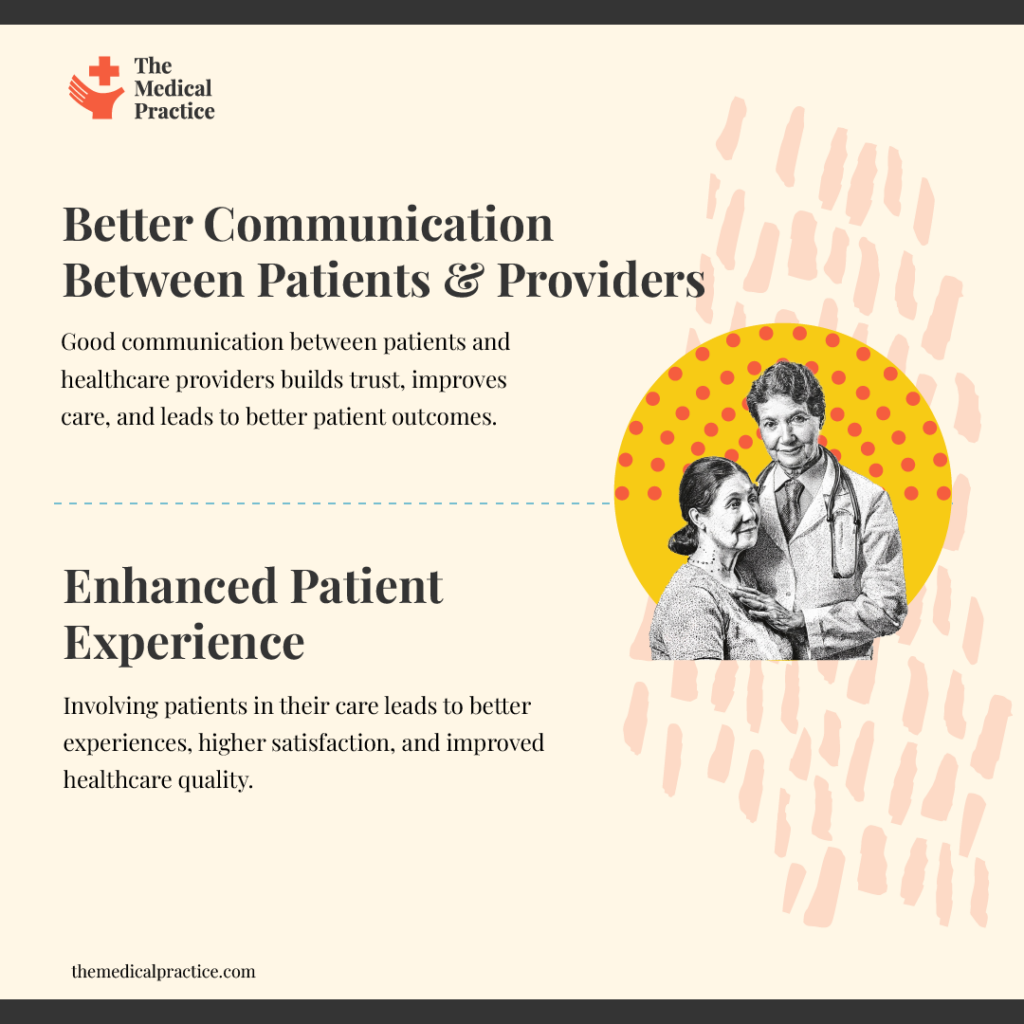
Enhanced Patient Experience
Patient engagement significantly enhances the overall patient experience. When patients feel involved in their care and confident in their healthcare providers, they are more likely to have a positive experience. Engaging patients in every aspect of their care, from decision making to follow-up appointments, helps to create a more patient-centered healthcare system that prioritizes patient needs and preferences.
By focusing on patient engagement, healthcare organizations can improve patient satisfaction, increase retention rates, and deliver a higher quality of care. The benefits of patient engagement extend beyond individual patient experiences, contributing to a more efficient and effective healthcare industry.
The Takeaway
To stay updated on the latest trends, best practices, and solutions related to your medical practice, subscribe to The Medical Practice newsletter.
